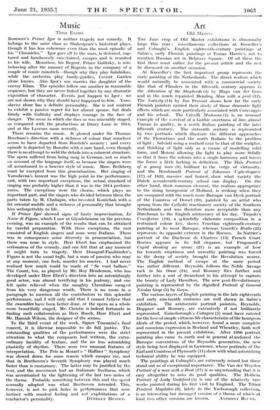Music Three Events BORODIN'S Prince Igor is neither tragedy nor
comedy. It belongs to the sane class as Shakespeare's historical plays, though it has less coherence even than the most episodic of his " Chronicles." Igor goes off to the wars, is defeated, cap- tured and handsomely enicrtained, escapes and is reunited to his wife. Meantime, his Regent, Prince Galitzky, is mis- behaving after the manner of Regents in the company of a couple of comic minstrels—though why they play balalaikas, while the orchestra play hurdy-gurdies, Covent Garden alone knows. Also Igor's son marries the daughter of the enemy Khan. The episodes follow one another in reasonable sequence, but they are never linked together by any dramatic exposition of character. Events just happen to Igor ; we are not shown why they should have happened to hint. Yaro- slavna alone has a definite personality. She is not content to exhibit a passive regret for her absent spouse, but deals firmly with Galitzky and displays courage in the face of danger. The scene in which she does so was miserably staged, as compared with the productions at Drury Lane in 1914, and at the Lyceum more recently.
There remains the music. It glowed under Sir Thomas Beecham's direction with a richness of colour that somehow seems to have departed from Roerich's scenery ; and every episode is depicted by Borodin with a sure hand, even though there is no attempt to weld the details into a coherent structure. The opera suffered from being sung in German, not so much on account of the language itself, as because the singers were all accustomed to a heavier style of music. Mine. Rethberg must be excepted from this generalization. Her singing of Yaroslavna's lament was the high point in the performance, and, with two important exceptions, the actual standard of singing was probably higher than it was in the 1914 perform- ances. The exceptions were the chorus, which plays an important part, and the singers who divided between them the parts taken by M. Chaliapin, who invested Kontchak with a fat oriental waddle and a richness of personality that brought him unforgettably to life.
If Prince Igor showed signs of hasty improvization, Le Nozze di Figaro, which I saw at Glyndebourne on the previous evening, was an example of the results that can be obtained by careful preparation. With three exceptions, the cast consisted of English singers and none were Italians. There was in consequence some diversity in pronunciation, but there was none in style. Herr Ebert has emphasized the seriousness of the comedy, and one felt that at any moment it might turn to tragedy. Herr Domgraf-Fassbander's Figaro is not the usual buffo, but a man of passion who may at any moment, one feels, murder his master. I had never realized how much could be made of " Se vuol ballare." The Count, too, as played by Mr. Roy Henderson, who has developed under Herr Ebert's direction into an astonishingly good actor, was almost terrifying in his jealousy, and one felt quite relieved when the naughty Cherubino escaped from his very dangerous wrath. There is no room in a paragraph to mention all the contributors to this splendid performance, and I will only add that I cannot believe that the ensembles have been better done, or the opera as a whole more beautifully staged. Mr. Christie is indeed fortunate in finding such collaborators as Herr Busch, Herr Ebert and Mr. Hamish Wilson, the designer of the scenes.
To the third event of the week, Signor Toscanini's final concert, it is likewise impossible to do full, justice. _ The outstanding qualities of the performances were the strict attention to what the composers had written, the extra-
ordinary lucidity_ of texture, and the no less astonishing plasticity of rhythm. There were two unusual features of interpretation. The Trio in Mozart's " Haffner " Symphony was slowed down for some reason which escapes me, and that in _Beethoven's Seventh Symphony was played much faster than is customary. The latter may be justified by the text, and the movement had an Italianate liveliness, which was accentuated by the lightening of the ,last two notes _of the theme. Probably something between this and the speed normally adopted was what Beethoven _intended. _This, however, is not to pick holes in performances that, were instinct with musical feeling and not exploitations of a








































 Previous page
Previous page